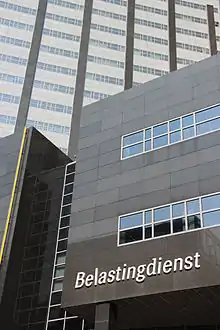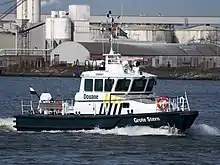Tax and Customs Administration
The Tax and Customs Administration (Dutch: Belastingdienst) is the tax collection and customs (Dutch: Douane) service of the government of the Netherlands. It is part of the Ministry of Finance and is responsible for levying and collecting taxes in the Netherlands.
 | |
 Belastingdienst building, Amsterdam | |
| Agency overview | |
|---|---|
| Type | Customs |
| Jurisdiction | Netherlands |
| Headquarters | 11, Rue des |
| Motto | Leuker kunnen we het niet maken, wel makkelijker ("We cannot make it more fun, but we can make it easier") |
| Parent department | Ministry of Finance |
| Website | belastingdienst |


Besides tax revenue, other operational areas of the Tax and Customs Administration include:
- Customs - supervising the import, export and transit of goods through the Netherlands
- Toeslagen - paying out income-related benefits for childcare, rent and health care
- Fiscal Information and Investigation Service (FIOD)
The Tax and Customs Administration was founded as an organization in 1805, and falls under the political responsibility of the Minister of Finance and the State Secretary for Finance.
In addition to the government tax service, there are many other tax authorities, such as the municipal tax authorities that deal with the collection and collection of local taxes.[1]
Role in society
The Tax and Customs Administration is responsible for raising the income of the government. From this income, general provisions are paid, such as roads, schools and certain benefits (assistance, allowances, child allowance). Furthermore, many subsidies from, for example, theater companies and sports clubs are paid from the general funds.
Organization
The Tax and Customs Administration is part of the Ministry of Finance and consists of nine organizational units: Particulieren (Individuals), Midden- en kleinbedrijf (Small and medium-sized enterprises), Grote ondernemingen (Large companies), Centrale Administratieve processen (Central Administrative processes), Klantinteractie en Services (Customer interaction and Services), Informatievoorziening (Provision of information), Douane (Customs), Fiscale inlichtingen- en opsporingsdienst (Fiscal intelligence and investigation service) and Toeslagen (Social security).[2]
The Director-General (DG) and the deputy DG (pDG) are in charge of the Tax and Customs Administration. The underlying services from the primary process are managed directly by the DG. The non-primary processes are largely controlled by the pDG.
Small Arms

Customs Agents are armed with Walther P5 pistols, as for the National Police and the Royal Marechaussee.[3]
References
- Belastingdienst. "Individuals". www.belastingdienst.nl. Retrieved 28 April 2018.
- "Directoraat-generaal Belastingdienst". Ministerie van Financiën. Rijksoverheid.nl. Retrieved April 28, 2018.
- https://www.startpagina.nl/v/maatschappij/vraag/372594/draagt-douanier-vuurwapen/